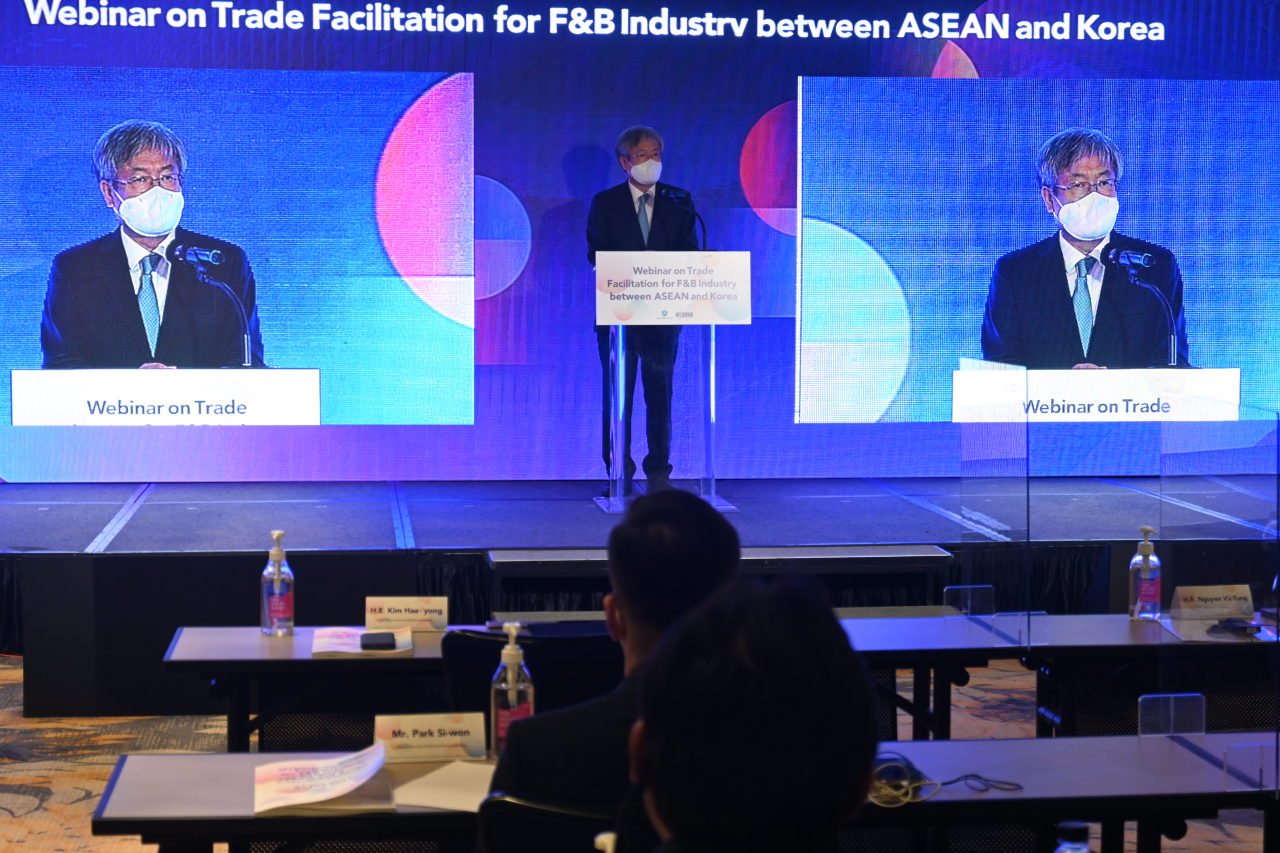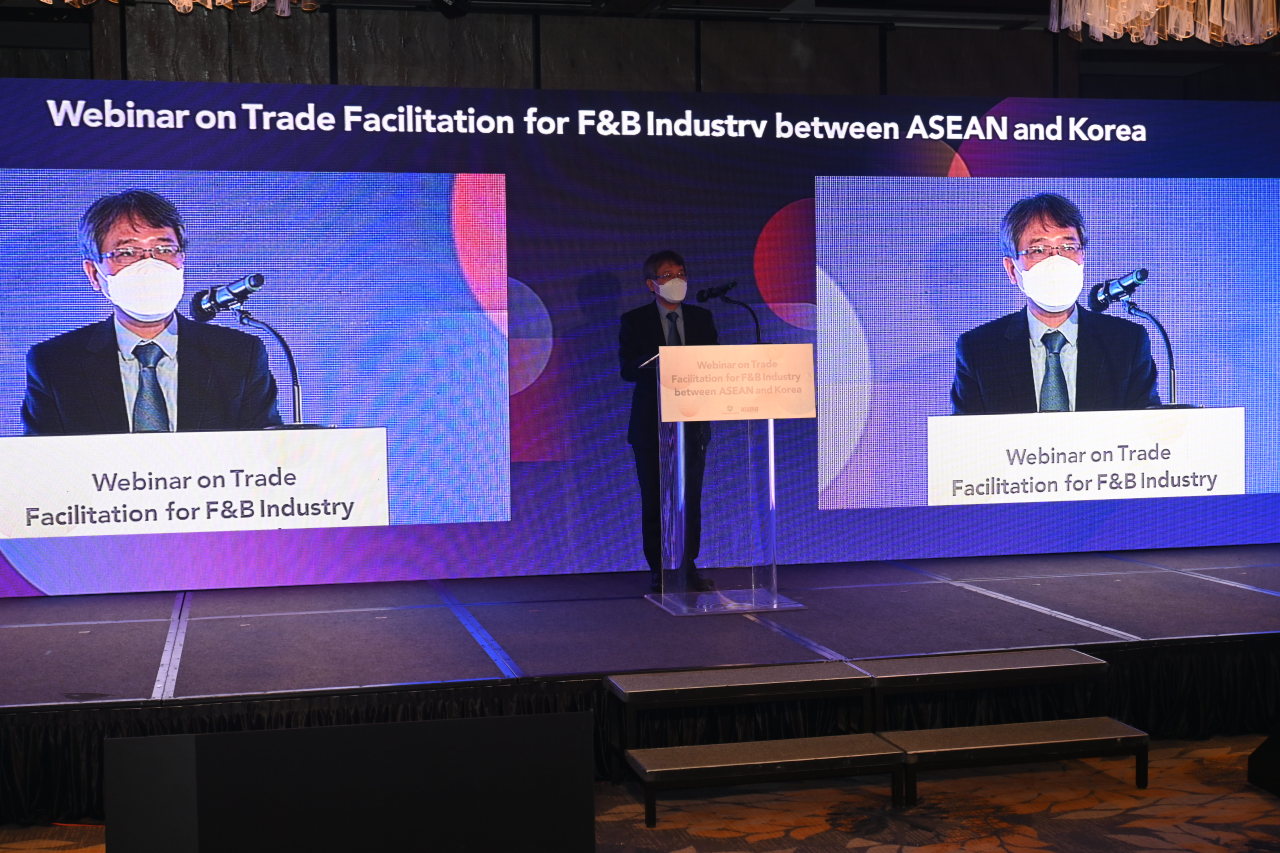 |
ASEAN Korea Centre Secretary-General Kim Hae-yong delivers opening remarks at a webinar on trade facilitation for the food and beverage industry at Four Seasons Hotel on Oct. 27. (Sanjay Kumar/Korea Herald) |
The ASEAN Korea Centre last week held a webinar on trade facilitation for the food and beverage industry at Four Seasons Hotel in Seoul, highlighting the importance of trade and cooperation for Korea and ASEAN.
The webinar facilitated information exchange with new business opportunities for food and beverage sector companies operating in ASEAN and Korea and explored effective ways to utilize the ASEAN-Korea Free Trade Agreement and the Regional Comprehensive Economic Partnership (RCEP), a free trade pact among Asia-Pacific nations.
Delivering the opening remarks, Secretary-General Kim Hae-yong said the food and beverage sector generated over $500 billion in economic production in the 10 Southeast Asian member states, accounting for 17 percent of the region’s total GDP. The sector employs 160 million people in ASEAN, accounting for 35 percent of the total workforce.
Kim said Korea’s imports of agricultural goods from ASEAN tripled in the last decade from less than $1 billion in 2010 to about $3.2 billion in 2020, an encouraging indication.
“Against this background, ASEAN and Korea is seeking to further strengthen economic partnership joining RCEP last November and enhance economic cooperation among ASEAN countries,” he said.
According to Kim, RCEP-- the world’s largest trade pact that spans countries accounting for almost 30 percent of the global GDP -- would bring more benefits to ASEAN and Korea, such as facilitating trade, reducing transaction costs, boosting security, accessibility consistency and transparency.
“ASEAN companies have huge business opportunities utilizing RCEP agreement to penetrate in to each other’s market for mutually beneficial and sustainable goal,” Kim said.
The secretary-general also extended an invitation to ASEAN members to the ASEAN Trade Fair and Seoul International Cafe Show that will showcase specialties from the region, such as coffee, tea and dessert products, and provide business networking opportunities.
The ASEAN Trade Fair is set to be held from Nov. 10-13 at Coex in southern Seoul.
According to Korea Importers Association Vice Chairman Hong Kwang-hee, ASEAN is one of Korea’s most significant business partners since it signed their free trade agreement came into force in 2007.
“Korea’s trade with ASEAN doubled from $72 billion in 2007 up to $142 billion in 2020,” Hong said.
Hong added that ASEAN’s total GDP was valued at $3.2 trillion last year, making it the sixth-largest economy in the world. The total ASEAN population stood at 660 million people, making the region the world’s third most populous after India and China.
 |
Vietnam Ambassador to Korea Nguyen Vu Tung speaks at a webinar on trade facilitation for the food and beverage industry at Four Seasons Hotel on Oct. 27. (Sanjay Kumar/Korea Herald) |
Vietnam Ambassador to Korea Nguyen Vu Tung highlighted the timely hosting of the webinar in context of the ASEAN-ROK summit held on Oct. 26.
According to Tung, in the last thirty years of ASEAN-Korea partnership, and especially under the last four years of Korea’s New Southern Policy, Korea has become a leading strategic partner of ASEAN.
“Bilateral relations between individual ASEAN countries with Korea have prospered, serving interests of the people,” Tung said.
“ASEAN countries and Korea were heavily affected by (the) prolonged COVID-19, production and supply chain interrupted and businesses faced hard time, workers lost jobs, consumption declined and investments reduced,” Tung said. “Yet ASEAN and Korea (have) seen economic efforts and national resilience.”
As Korea gradually shifts the strategy to “living with COVID,” Tung expects it to speed up the economic recovery process in the region.
Tung stressed that the RCEP would open new opportunities in the food and beverage industry and more items would reach Korean consumers and vice versa.
He suggested to advance growth in trade between ASEAN and Korea by enhancing trade competitiveness, being better informed of import regulations and procedures, and holding each other to high standards.
Meanwhile, the webinar covered several special lectures aimed at accelerating regional trade relations, they included: “Plant Quarantine Procedures,” “Safety Control Policy for Imported Foods in Korea,” “Import Customs Procedures,” “Sourcing F&B market trend in Korea,” “Sourcing trend of Coffee market in Korea,” and “Case Study on ASEAN Food Sourcing.” They were hosted by experts from the Ministry of International Trade and Industry of Malaysia, Ministry of Food and Drug Safety, Korea Customs Service and Korea Agro-Fisheries & Food Trade Corp.
By Sanjay Kumar (
sanjaykumar@heraldcorp.com)





![[Herald Interview] 'Trump will use tariffs as first line of defense for American manufacturing'](http://res.heraldm.com/phpwas/restmb_idxmake.php?idx=644&simg=/content/image/2024/11/26/20241126050017_0.jpg)


![[Herald Review] 'Gangnam B-Side' combines social realism with masterful suspense, performance](http://res.heraldm.com/phpwas/restmb_idxmake.php?idx=644&simg=/content/image/2024/11/25/20241125050072_0.jpg)
![[Health and care] Getting cancer young: Why cancer isn’t just an older person’s battle](http://res.heraldm.com/phpwas/restmb_idxmake.php?idx=644&simg=/content/image/2024/11/26/20241126050043_0.jpg)